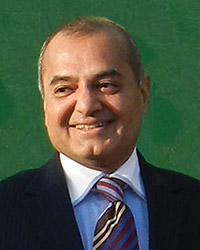
Dear Friends and Colleagues, As we conclude FY 2022- 23, and read India’s 2023-24 annual budget, we can analyse the year gone by and approximations for the coming year. Inflation is at 8 percent, compared to the 3 percent we hoped for. GDP growth is at 6 percent, lower compared to the 7.5 percent that we aimed for. That said, India enters the new financial year relatively unscathed from the consequences of the Russia-Ukraine war and the recessionary trends led by UK, Europe and the US non withstanding the collapse of Silicon Valley Bank. The world is seeing the tightening of monetary policies across most nations. It is after 15 to 20 years that we are seeing interest rates increasing and the cost of money rising. India’s annual budget emphasizes on stability with creation and growth of infrastructure remaining overarching objectives. Ports, rails and roads continue to get investment and encouragement. Manufacturing and exports are pushed with positive policy intervention. This is happening with an emphasis on digitization and technology growth. The overarching direction has been focusing on value addition. The stress on the banking system has continued to ease with the number and magnitude of non-performing assets (NPAs) reducing, leading to a stronger and cleaner banking and credit system.
In terms of trade volumes, India has shown remarkable resilience, and although the numbers have not shown runaway growth, we have seen the numbers hold, and in some commodities and ports, they have grown.
At the end of the calendar year, major container shipping companies have declared never-before-seen profits. This is despite the last quarter of the year seeing a steep fall in freight rates, cargo volumes and therefore profits.
Container shipping carriers have entered 2023 with considerable strength and bulging order books for new ships. This will be necessary because today almost 23 percent of the world’s container tonnage is over 20 years old. The shipping industry in general and containers in particular are also grappling with being future fuel ready as also future right-size ready.
The deliveries this year of ships larger than 6,000 TEU size are more than 130.
From an Indian perspective, larger ships are being pressed into various Indian services, and additional services are opening up from India to various trade routes both westbound and eastbound.
The world of bulk shipping has been relatively smooth sailing, with both cargo volumes across commodities and geographic trade remaining stable. Gas carriers have also continued to do well due to enhanced gas movements from US to Europe, on the back of sanctions on Russia.
The J M Baxi Ports & Logistics business have been hard at work. Nhava Sheva Freeport Terminal, the joint venture between J M Baxi and CMA CGM achieved a milestone as it accepted its first ship, M V CMA CGM Melisande. This project will be fully commissioned well before the stipulated time. Our other terminals, Inchhapuri rail terminal and the Nhava Sheva Distribution Terminal are making good progress, and with the commissioning of an electric RTG, our Delhi Inland Container Terminal, achieved a throughput of 17,000 TEU in January 2023.
At the corporate level, Bain Capital have decided to exit their investments and sell their holdings to Hapag Lloyd, subject to requisite approval from the Government of India and when they exit we are sure that their expectations and aspirations will be exceeded. We will welcome with all honour and humility the entry of Hapag Lloyd and we hope to jointly grow together, feeding into each other's aspirations and strengths.
I am happy to share that Portall has won the mandate for implementation of the Port Community System for Mawani Ports in the Kingdom Saudi Arabia. J M Baxi Technologies are indeed beginning to convert their steps into strides.
One of the greatest challenges and opportunities that lie before us is the transition into clean green energy. Over the next few years, the changes are going to be phenomenal and irreversible. As a company, we have to keep ourselves at the cutting edge of development. Across our various verticals, we are reworking and recalibrating all our processes and erecting a new paradigm. I continue to urge each of our J M Baxi colleagues to be a volunteer in this mission. The traction and interest we are receiving from our clients, customers, and principals for such initiatives have been phenomenal.
The second great opportunity before us is enhancing the skills of our colleagues. We all know that one of the greatest managerial challenges is ‘PEOPLE’ - the right people, the right person in the right place. JMB-Uni-E and VIPM are two of our entities that are transforming themselves into strong initiatives. The curriculum and this faculty are fastgrowing, relevant and forward-looking. Across our group, we are planning internships, mentorships and upskilling programmes.
Last year India reached the 5th position with a GDP of US $ 3.2 Tn. By the year 2030, India will become a US $ 5 Tn economy, and the volumes of cargo to be handled in India should be at least 30 Mn TEU (presently 19 million TEU) and 5 Bn ton (present volume of 1.4 Bn ton). To be able to handle such an amount of business and growth, skilled people will be a must.
As we begin a fresh new start, I look forward to us at J M Baxi becoming leading change agents in pursuit of a brighter future.
Krishna B. Kotak
Chairman - J M BAXI GROUP